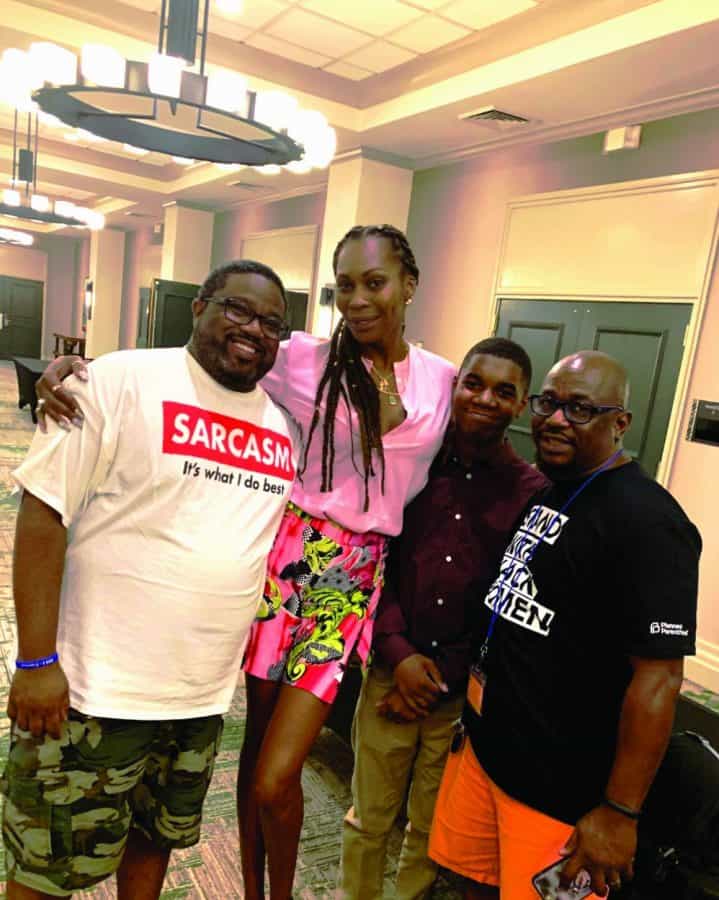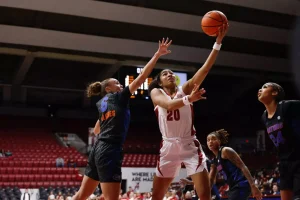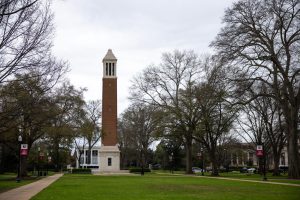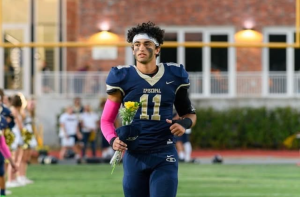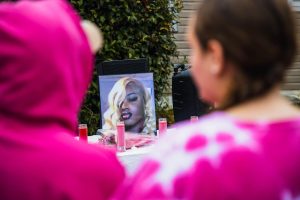Black Pride provides sense of community in tumultuous times
August 19, 2019
The Birmingham Black Pride festival took place over four days last week. Celebrating LGBTQ people of color across the state, the community welcomed any and all people who wished to join in their festivities and programs.
Dominique Jackson’s Saturday morning seminar encouraged strangers to switch seats and find people they didn’t know. They held hands. They said, “I love you.” They hugged one another, and no one had to justify anything to anyone. Pride takes many different forms, but this show of unity was a special one for those gathered that morning.
Jackson, the transgender actress who plays Elektra in the FX series Pose, spoke to those attending Birmingham Black Pride’s Empowerment Conference. She emphasized the need for trans support from the larger LGBTQ community, as well as the need for supporting and protecting trans sex workers.
“Trans people are constantly sexualized and fetishized by privileged communities,” Jackson said. “We are treated as objects to be used, abused, and even disposed of, not treated as men and women like anyone else.”
Birmingham Black Pride (BBP) was developed as a racially focused addition to Pride Month for Alabamians. Separate from Central Alabama Pride’s (CAP) Pride Month activities, the event was created to highlight the additional challenges LGBTQ people of color can face. BBP’s founders described being blown off by the CAP board during the planning stages over the last few years, leading to the creation of their own event.
“I’m not sure how much it was intentional, but white people have a way of thinking they can plan something and have it just fit everybody,” BBP co-founder Tony Christion-Walker said. “They may have a party and not play any music like rap or hip-hop because they don’t want black people to show up… A lot of white gays think they can’t be racist, but they still can be. There weren’t even any black people on the Central Alabama Pride board until this past year.”
Christion-Walker and several other BBP board members and volunteers work at AIDS Alabama, a nonprofit that supports those living HIV-positive and works to prevent the spread of the virus. These connections aided organizers in finding community sponsors for BBP’s many events.
“We found allies in several national and local companies that wanted us to have a voice,” Christion-Walker said. “The LGBTQ Fund [of Greater Birmingham] always tries to find money to support the community, and ViiV Healthcare gave us a substantial sponsorship this year, even greater than last year. And of course we pay the venues where we hold our events, but they also give us really good deals.”
The opening awards banquet on Friday honored local LGBTQ advocates, activists and allies in a formal dinner setting. Emcee Quentin Bell received the Gamechanger award for healthcare and visibility activism. Bell, a local trans man, was Alabama’s featured Pride Activist of 2019.
There were somber moments at the banquet despite the celebratory atmosphere. Local pansexual poet Qadira Miner performed a poem memorializing Nigel Shelby, a gay black Huntsville high school student who took his own life earlier this year. Neo-soul and jazz artist Ashley Sankey also brought her craft to the banquet with a song commemorating the efforts of the BBP’s community. It was during these moments that the gathered crowd appeared the most united.
“I think this is just a safe space for people,” Nicholas Reese, a UA senior majoring in vocal performance, said. “I don’t think there are enough safe spaces in society that deal with sexuality and anything that comes with that. [BBP] provides a place where people can come and not only be sure they will be accepted, but also know there won’t be any repercussions outside of this space. It really provides a nice sense of family for a lot of people.”
In addition to the celebration, several speakers presented seminars at the educational Empowerment Conference on Saturday morning. Guests spoke on LGBTQ spirituality, self-love, HIV prevention and supporting trans men and women of color.
“Churches have become like businesses in our culture, and like many businesses, they only become queer-friendly when it suits their interests,” Dr. David Barnhart, pastor of St. Junia United Methodist Church, said. “For a lot of people, it’s just a matter of finding a church that affirms them … But the early church met in homes, with no big programs or buildings, and that’s a real option for queer people of color today. If you’ve got just one other person that has your back, you meet together and you pray for each other, then you’ve got a church.”
Several parties were held in addition to the banquet, and a house picnic closed the festival on Sunday. But the festival did experience some growing pains in late starts and last-minute adjustments. Friday’s awards banquet was more than 30 minutes behind schedule, and the program had to be amended to keep the dinner timely. The same problem occurred at the Empowerment Conference, both events being the only ones where time was an important factor.
However, the BBP fulfilled a need for a pride representative of people of color. People of all races, orientations and identities were welcome at every event. The BBP board successfully created and celebrated a tight-knit community with no distinctions.



